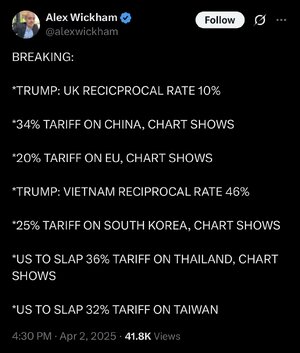Donald Trump has achieved his first global peace deal. China, Japan and South Korea have kissed and made up after years of trade quarrels. They have pledged to deepen ties and reorganise the Asian and global trading systems under what amounts to Chinese leadership.
The picture blazoned across Asia’s front pages – though barely registering in the US – showed the trade ministers of the three economic powers holding hands in a collective gesture of Asian defiance.
It is one of the most striking economic defeats suffered by America that I have witnessed in more than 40 years covering international affairs.
Trump’s “liberation day” cuts two ways.
They agreed to forge ahead with free trade agreements but also to flesh out the Regional Comprehensive Economic Partnership (RCEP), the world’s largest trade pact on paper and a venture viewed by US hardliners as a Trojan horse for Chinese commercial hegemony.
“For all intents and purposes, the US is now a rogue nation when it comes to trade,” said Michael Gasiorek, the director of the UK Trade Policy Observatory at the University of Sussex.
“I don’t think there is a global trade war going on. The US is fighting a trade war with everybody but the others are keen to co-operate even more.”
...
This was unthinkable just weeks ago, when the Commission’s mantra was “derisking” the supply chain, and the two sides were daggers drawn over EU tariffs on electric vehicles.
China is still smarting over the EU’s sweeping investigations into Chinese technology theft and predatory investments. The EU is still smarting over the tsunami of Chinese exports flooding its market, which has pushed China’s structural trade surplus with Europe above €300bn (£250bn).
But they both have
a bigger wolf to contend with today.
He Lifeng, China’s vice-premier, said the two economic blocs should team up to defend themselves against Trump’s assault on the global trading order.
“China is willing to work with the EU to handle economic differences in the proper manner,” he said.


